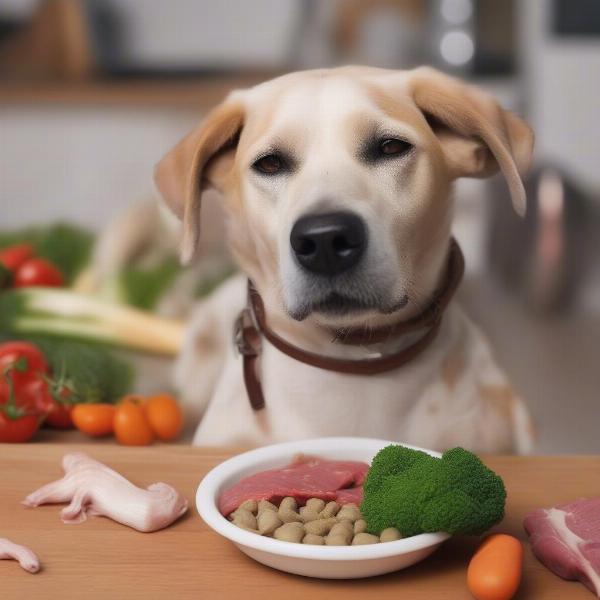A raw food diet for dogs with allergies is becoming increasingly popular amongst pet owners. Many believe it offers a natural way to manage allergies and improve overall canine health. But is it the right choice for your furry friend? This article dives deep into the world of raw food diets for allergic dogs, exploring the potential benefits, risks, and everything you need to know to make an informed decision.  Dog with allergies eating raw food
Dog with allergies eating raw food
Understanding Food Allergies in Dogs
Before jumping into a raw food diet, it’s crucial to understand what dog food allergies are. Unlike environmental allergies, food allergies are triggered by specific proteins in a dog’s diet. Common culprits include beef, chicken, dairy, wheat, and soy. Symptoms can manifest in various ways, from itchy skin and ear infections to gastrointestinal issues like vomiting and diarrhea. A proper diagnosis from a veterinarian is essential before making any dietary changes.
The Potential Benefits of a Raw Food Diet for Allergic Dogs
Proponents of raw food diets argue that they eliminate processed ingredients, artificial additives, and common allergens found in commercial dog food. This can be particularly helpful for dogs with sensitivities to these ingredients. By feeding a limited ingredient raw diet, owners can pinpoint the specific allergens affecting their dog and eliminate them.
Is a Raw Food Diet Right for My Allergic Dog?
This depends on several factors, including your dog’s specific allergies, your ability to prepare the food safely, and your budget. Raw food diets require careful planning and preparation to ensure nutritional balance.
What Does a Raw Food Diet for Allergic Dogs Look Like?
Typically, a raw food diet includes raw meat, bones, organs, vegetables, and fruits. It’s vital to choose novel protein sources your dog hasn’t been exposed to before, such as venison, rabbit, or kangaroo.
The Risks and Considerations of Raw Food Diets
While raw food diets offer potential benefits, they also come with risks. Raw meat can contain harmful bacteria like Salmonella and E. coli, which can pose a threat to both dogs and humans. peak dog food Nutritional deficiencies are another concern if the diet isn’t properly balanced. Consulting with a veterinary nutritionist is highly recommended before starting a raw food diet.
How to Safely Prepare a Raw Food Diet
Hygiene is paramount when preparing raw dog food. Wash your hands thoroughly, use separate cutting boards and utensils for raw meat, and store food appropriately.
Transitioning to a Raw Food Diet
Introduce the raw food gradually to avoid digestive upset. Start by mixing small amounts of raw food with your dog’s current food and slowly increase the proportion over several days or weeks.
Alternative Options for Dogs with Allergies
If a raw food diet isn’t feasible, there are other options for managing food allergies. Hydrolyzed protein diets break down proteins into smaller pieces, making them less likely to trigger an allergic reaction. dr john grain free dog food Limited ingredient diets contain a restricted number of ingredients, making it easier to identify and eliminate allergens.
“A raw food diet can be beneficial for some allergic dogs, but it’s essential to approach it with caution and consult with a veterinarian,” advises Dr. Emily Carter, DVM. “Proper hygiene, nutritional balance, and careful monitoring are crucial for success.”
“Remember, every dog is different,” adds Dr. Robert Lee, DVM, PhD. “What works for one dog may not work for another. Work closely with your vet to find the best dietary solution for your individual pet.” hot spot cream for dogs
Conclusion
A raw food diet for dogs with allergies can be a viable option, but it requires careful consideration, planning, and veterinary guidance. By understanding the potential benefits and risks, and by working closely with your veterinarian, you can make an informed decision about whether a raw food diet is the right choice for your allergic dog. cold pressed dog food
FAQ
- Is a raw food diet more expensive than commercial dog food? Often, yes, due to the higher cost of ingredients and preparation time.
- Can puppies eat a raw food diet? Yes, but it’s crucial to ensure the diet is nutritionally complete for growing puppies.
- What if my dog refuses to eat raw food? Try different protein sources and textures, or mix a small amount of cooked food initially. black hawk dog food grain free
- How often should I feed my allergic dog a raw food diet? Most adult dogs thrive on being fed once or twice a day.
- Are there any supplements I should add to a raw food diet? This depends on the specific diet and your dog’s individual needs. Consult your veterinarian.
- Can a raw food diet cure my dog’s allergies? While it can manage symptoms, it’s unlikely to cure allergies completely.
- How do I know if my dog is reacting negatively to a raw food diet? Watch for signs like vomiting, diarrhea, skin rashes, or changes in behavior.
ILM Dog is your trusted partner in pet care, offering expert advice and resources on dog breeds, health, training, nutrition, grooming, and much more. We are dedicated to providing dog owners worldwide with reliable, practical information to help them provide the best possible care for their furry companions. For any questions or assistance, feel free to contact us via email at [email protected] or phone at +44 20-3965-8624. ILM Dog is here to support you every step of the way.